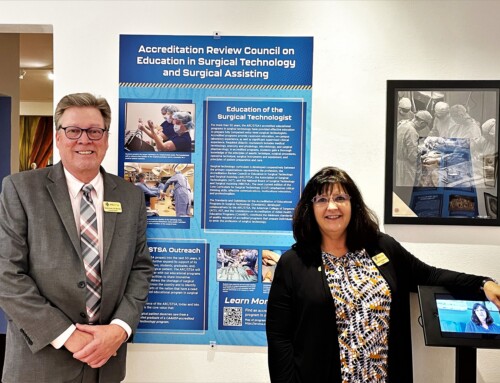By Tonya LaForge, Director of Nursing Programs, Angelina College
As a surgical technology program director, I believe it is imperative that faculty are supported to attend conferences. It is extremely important for one to increase their understanding and knowledge in their respective field. Conferences give faculty the opportunity to stay abreast of the latest evidence-based practices, guidelines, protocols, procedures and technological advances. They also provide faculty the opportunity to network and build working relationships across the country.
First, conferences increase understanding in the presented subject matter. This, in turn, creates a more educated faculty member who can then utilize and pass along the information/content to students and colleagues. Information is progressively changing and updated, and therefore educators should keep up with current data. Upon attending conferences, positive changes can be made from the presented information. Since most conference information is presented based upon evidence-based practice, faculty who attend conferences have the advantage of learning the most up-to-date information. This improves the information relayed to students and working practice, and ultimately affects the patients.
Conferences are very uplifting and re-energizing for faculty. They can reiterate and reinforce information that has already been obtained. While at conference, if a director did not know the presented material, they are eager to return to their program and implement the changes necessary to create a more consistent and efficient learning environment. They also have a desire to implement new practices and technologies to keep their programs progressive. If a director already knows the presented material, then they feel very proud and confident that they are already delivering the appropriate content and producing competent, knowledgeable students.
Conferences also give the faculty members a chance to expand their resources and evaluate themselves and their programs. Attendees have the opportunity to connect with textbook and simulation vendors and equipment and supply companies. They can also converse with colleagues on their techniques and delivery options. Conferences give the faculty member a chance to really do some research by networking and talking with others about the pros and cons of a particular practice or piece of equipment. This can save a lot of time and money when considering adopting a new concept, idea or piece of equipment.
Finally, conferences help faculty to better connect with their students. Faculty members learn new ways on how to keep students engaged and how students of varying ages or cultures learn. Faculty learns how to accommodate and remediate students. They also learn how to deliver content to the different learning styles of a multitude of students, thus facilitating, enhancing and grasping the information, ultimately increasing retention and pass rates.
Budget can be a constraint for supporting faculty in attending conferences. However, it is beneficial for faculty to acquire the most current standards of practice. When administration fails to support faculty in this way, it decreases morale and confidence in their ability to deliver content to students. This can increase faculty turnover and cause a decrease in competency of the faculty overall.
When faculty members are allowed to attend conferences, it is a great benefit to all because the conference information follows the faculty member and is now able to be spread among everyone within the healthcare team. Faculty members who are willing to broaden their depth of knowledge and experience should be given every opportunity to do so. Administration must continue to support faculty’s attendance to conferences in order for faculty to demonstrate their confidence, commitment and advancement in their profession.
 Tonya LaForge, MSN, RN, CNOR, CST, earned her associates degree in nursing from Angelina College in 1997 before graduating with her B.A. in nursing from Stephen F. Austin State University in 2008. That same year, she began the surgical technology program at Angelina College. She has since then obtained her masters in nursing from the University of Texas at Tyler. She is also a certified surgical technologist (CST) and a certified nurse of the operating room (CNOR). She recently transitioned from the director of surgical technology to the director of nursing programs at Angelina College.
Tonya LaForge, MSN, RN, CNOR, CST, earned her associates degree in nursing from Angelina College in 1997 before graduating with her B.A. in nursing from Stephen F. Austin State University in 2008. That same year, she began the surgical technology program at Angelina College. She has since then obtained her masters in nursing from the University of Texas at Tyler. She is also a certified surgical technologist (CST) and a certified nurse of the operating room (CNOR). She recently transitioned from the director of surgical technology to the director of nursing programs at Angelina College.



